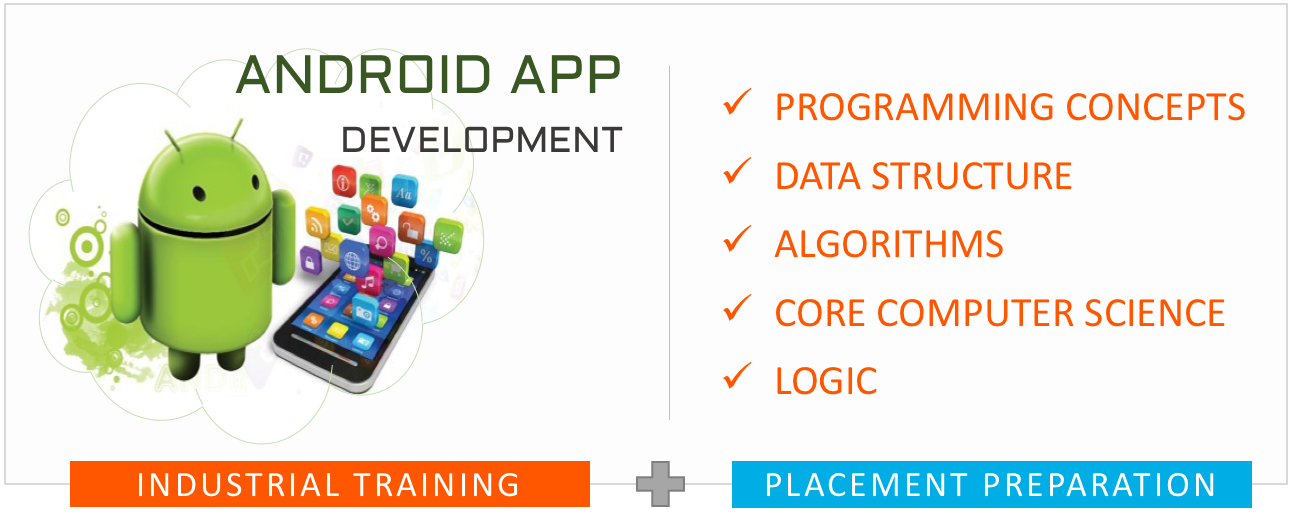INDUSTRIAL TRAINING + PLACEMENT PREPARATON
Campus placements will start after few months.
ARE YOU READY ?
PREPARE YOURSELF FOR UPCOMING PLACEMENTS AND BE JOB-READY.
Join our 2-months ONLINE (LIVE) classes to prepare for all kinds of placements test/Interviews along with your Industrial Training.

Fresh batch starting from 21st April, 2020.
This course is created by experts working at decision making positions in top IT companies of the world.
The course will end before the placement season starts in your college. Learn everything needed to be Interview-Ready before the start of placement season.
The syllabus of service companies like Infosys, Wipro, TCS etc. is different from Product companies like Google, Microsoft, Adobe, Amazon.
This course will prepare you for Test/Interviews of all kind of companies along with the live project that you do as part of your Industrial training.
COURSE HIGHLIGHTS ?
DOUBLE BENEFIT. Industrial Training + Placement Preparation.
PERSONAL MENTORSHIP. Less than 10 students per batch
EXPERT TRAINER. Employee of Microsoft, Amazon, Adobe
COMPREHENSIVE COVERAGE. Covers test of each company from Infosys to Google.
100% ONLINE. Live classes - No Prerecorded Videos
MOCK-TEST. MOCK-INTERVIEWS
DOUBLE BENEFIT. Industrial Training + Placement Preparation.
PERSONAL MENTORSHIP. Less than 10 students per batch
EXPERT TRAINER. Employee of Microsoft, Amazon, Adobe
COMPREHENSIVE COVERAGE. Covers test of each company from Infosys to Google.
100% ONLINE. Live classes - No Prerecorded Videos
MOCK-TEST. MOCK-INTERVIEWS
Sample Class Videos
STUDENT'S FEEDBACK
HAVE A QUESTION? SCHEDULE CALL BACK.
CONTENTS
Our trainers have worked in Microsoft, Adobe, Amazon and have been taking programming interviews for more than 10 years. We have designed our course keeping in mind the selection pattern of top companies. Many people from these companies are on board as mentors and take mock interviews.

PLACEMENT PREPARATION CONTENT
| C Language:
- Logic Building, etc - Covers the programming language in detail from interview point of view. |
| Basic Concepts:
- What happens under the hood: Life cycle of a program, the memory internals, etc - Understanding Time and Space Complexities and how to compute them intuitively without any equation. - Pointers and Memory: Pointers are rampant in coding data structure and need to be well understood, not just from usage point of view, but also how they look internally. - Conceptualising your abstract logic as code. |
| Data Structure:
- Covers all major data structures starting from Arrays, Strings, Struct, Union, Linked list, Stack, Queue, Binary Trees, Graphs, Hash table, Heap and some of the not so common DS like sparse arrays, skip list, etc. Others data structure like Class are covered in OOPs. - Variations of above data structures are also covered. For example, while discussing Binary Tree, we also discuss, General tree, BST, Multi-way search tree, balanced binary tree, B-Tree and Trie. - Multiple implementations for each data structure is covered while studying that data structure. - After the tutorial, a good amount of time is spent on the interview questions asked around each data structure. After studying Stack, we also discuss questions like, “Add getMinimum function to stack that returns minimum element of stack in constant time”. - Understanding the Data Structure from creators point of view. For example, how implementation of HashMap in Java is changed over time to improve its performance (with changing the interface). |
| Algorithms: There are many problem solving tools. We cover every algorithm that is important from Coding interviews. - Searching: Linear search & Binary search for all the data structures like Array, Linked list, Binary tree, Graphs. - Sorting: Starting with the basics concepts like Stable-Unstable sorting, Comparison-Non- Comparison sorting, Divide & Conquer, in-place sorting we move to discussing every important sorting algorithm like Bubble, Selection, Insertion, Quick, Heap, Merge, Counting, Bucket and Radix along with their major variation (like Shell sort, library sort, etc.). - Recursion: Recursion is one the most powerful tool to problem solving even when it takes more time and memory compared to non-recursive. Problem like tower-of-hanoi or even tree traversals are very difficult to do without recursion. It is covered in great detail. - Dynamic Programming: some of the most difficult questions asked in Coding interviews are from DP. - Greedy Approach: It may not be applicable to all situations, but where it works, it give us the best solutions. - Divide & Conquer: Another problem solving approach that is rampant from Binary search to Quick sort. - Back tracking: Identifying & solving problems using back tracking. - String Matching: This is a separate area in itself, because of its usage. We cover major string matching algorithms like KMP, Robin karp, etc. |
| Object Oriented Concepts in Java:
- Class & Object - Abstraction, Inheritance, Polymorphism. - Basic Design Paterns of OOPS |
| DBMS:
- Schema Building - SQL and query formation - Normal Forms |
| Multi-Threading & Synchronization:
- Process & Threads - Critical Section. |
| Puzzles & Logic Building:
Google has changed their policy of asking abstract puzzles. But companies still ask logical puzzles. In this section we focus on different types of puzzles and logical questions asked in coding interviews. |
| Using Bit-wise Operations in problem-solving |
| Logical Templates that can be used in problem solving (e.g Sliding Window, Permutations, etc.) |
| Introduction to Online Competitive coding platforms like HackerRank, CodeChef, etc. |
